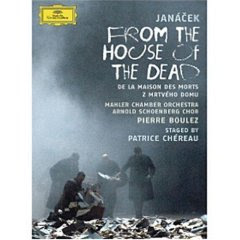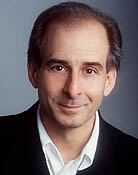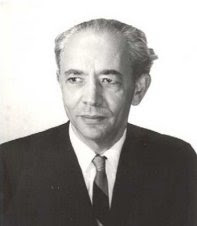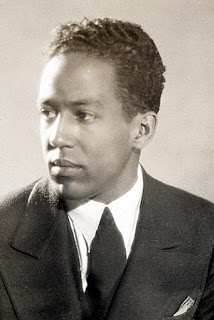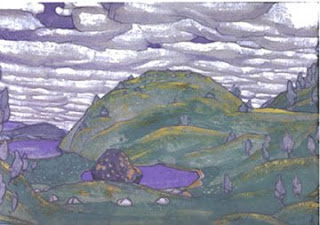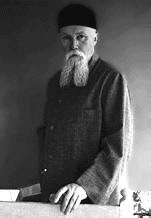


 Post-Classical Ensemble Investigates Artists in Exile
Post-Classical Ensemble Investigates Artists in Exile Clarice Smith Performing Arts Center, Gildenhorn Recital Hall, University of Maryland, College Park
Sunday, April 6, 2008, at 3pm.
Pre-concert Prelude (on film-maker Fritz Lang) at 2pm.
Angel Gil-Ordóñez, Musical Director and Conductor; and Joseph Horowitz, Artistic Director.
"Aligned with Joseph Horowitz’s forthcoming book
"Artists in Exile" (HarperCollins February 2008 -- see below), this upcoming program explores the impact of immigration on two major German and Austrian composers: respectively, Kurt Weill and Arnold Schoenberg. The program provides "before and after" snapshots of the composers, both of whom, upon exile to America, created patriotic musical responses to Pearl Harbor and America’s declaration of war: Weill’s "Walt Whitman Songs" (1942-47) and Schoenberg’s "Ode to Napoleon" (1942).
The program's 'before' snapshot of German composer
Kurt Weill includes "Die Morität vom Mackie Messer (Mack the Knife)" (1928) and "Kleine Dreigroschenmusik (Little Threepenny Music)" (1928), which epitomizes Weill's scathing Berlin style. By contrast, the "after" portrait includes the American orchestral premiere of the full set of little known "Walt Whitman Songs." Weill sets four Civil War poems — "Beat! Beat! Drums!" (1942);
"Oh Captain! My Captain!" (1942); "Come up from the Fields, Father" (1947); and "Dirge for Two Veterans" (1942) — as breezy Broadway ballads that serve as a grateful wartime tribute to Franklin Delano Roosevelt.
The second half of the program features Austrian composer
Arnold Schoenberg's "Three Piano Pieces, Op. 11" (1909), juxtaposed with another wartime tribute to FDR, his "Ode to Napoleon Buonaparte, Op. 41" (1942), based on a poem by Lord Byron and scored for piano, string quartet and a reciter. Schoenberg’s Ode to Napoleon, composed in Los Angeles, is (again) a grateful wartime tribute to FDR composed in English, and all the more moving for applying the Expressionist idiom he brought with him from Austria.
With the participation of baritone Chris Pedro Trakas in “Mack the Knife,” the Whitman Songs, and the Ode, and the Left Bank String Quartet (David Salness and Katherine Murdock, violins; Sally McLain, viola; and Evelyn Elsing, cello)."
*
During
Paul Hindemith's wartime exile in the United States, conductor Robert Shaw commissioned Hindemith to set the text of Walt Whitman's Abraham Lincoln elegy "When Lilacs Last in the Dooryard Bloom'd" [see poem below] to music in his 1946 "When Lilacs Last in the Dooryard Bloom'd (A Requiem for Those We Love)." Hindemith, who taught in exile at Yale University, dedicated his Requiem to Franklin Delano Roosevelt and the Americans who fought and died in World War II [Americans known to U.S. Public Broadcasting System television viewers -- if not Classical WETA-FM listeners -- as "The Greatest Generation").
American classical composer
Roger Sessions also set the Walt Whitman Abraham Lincoln elegy in his cantata "When Lilacs Last in the Dooryard Bloom'd", 1971, which was commissioned by the University of California at Berkeley and dedicated by the composer to the memories of Martin Luther King, Jr. and Robert Kennedy.
American classical composer
George Crumb composed his powerful song cycle "Apparition" in 1979, using mostly the "Death Carol" section of the Walt Whitman elegy to Abraham Lincoln.
Despite its tax-payer supported status,
Sharon Percy Rockefeller's Classical WETA-FM, so-called 'public radio' in 'Greater Washington', has never programmed the Paul Hindemith, Roger Sessions, nor George Crumb American classical music settings of Walt Whitman's elegy to Abraham Lincoln. It is expected that this will change after January 2009, when Ms. Rockefeller is replaced as President and CEO of Classical WETA-FM.
*
ARTISTS IN EXILE:
How Refugees from War and Revolution
Transformed the American Performing Arts by Joseph Horowitz
(HarperCollins, due Spring 2008)
“What today is the meaning of foreign, the meaning of homeland? . . . When the homeland becomes foreign, the foreign becomes the homeland.”
- Thomas Mann, 1941 (Santa Monica, California)
TABLE OF CONTENTS
INTRODUCTION: CULTURAL EXCHANGE
CHAPTER ONE: HOW TO BECOME AN AMERICAN: A FORTUITOUS PARTNERSHIP OF DANCE AND MUSIC
St. Petersburg and Sergei Diaghilev educate George Balanchivadze – Balanchine invents an American ballet – Igor Stravinsky eyes America – The Balanchine /Stravinski synthesis – Returning to Russia
CHAPTER TWO: THE GERMAN COLONIZATION OF AMERICAN CLASSICAL MUSIC
Rudolf Serkin and the “Berlinerisch”spirit – The German-American juggernaut – Strangers in America: Otto Klemperer and Dimitri Mitropoulos – Composers on the sidelines: Arnold Schoenberg, Paul Hindemith, Bela Bartok – Erich Korngold wows Hollywood – Kurt Weill tackles Broadway
CHAPTER THREE: THE MUSICAL “MARGIN OF THE UNGERMAN”
Edgard Varese and the sirens of Manhattan – Leopold Stokowski invents himself – Serge Koussevitzky in search of the Great American Symphony – Arturo Toscanini and the culture of performance
CHAPTER FOUR: “IN HOLLYWOOD WE SPEAK GERMAN”
Marlene Dietrich and “The Blue Angel” – The New German Cinema relocates to California – Fox’s “German genius”: F. W. Murnau – The Lubitsch touch – Garbo laughs – Fritz Lang’s American exile – Four who came and went: Victor Sjostrom, Rene Clair, Jean Renoir, Max Ophuls – Inside operator: Billy Wilder – Salka Viertel’s salon and the blacklist
CHAPTER FIVE: DELAYED REACTION: STANISLAVSKI, TOTAL THEATER, AND BROADWAY
Max Reinhardt: an unattainable opportunity - Bertolt Brecht and HUAC – Alla Nazimova inhabits Hedda Gabler – The Stanislavski influence – Rouben Mamoulian’s choreographic touch – Boris Aronson and the Meyerhold ideal – Immigrants and American musical theater
CONCLUSION
Summarizing cultural exchange: Thomas Mann and Vladimir Nabokov – Postscript: The Cold War – Cultural exchange and the twenty-first century
*
When Lilacs Last in the Dooryard Bloom'd by Walt Whitman [Leaves of Grass/Book XXII] 1
When lilacs last in the dooryard bloom'd,
And the great star early droop'd in the western sky in the night,
I mourn'd, and yet shall mourn with ever-returning spring.
Ever-returning spring, trinity sure to me you bring,
Lilac blooming perennial and drooping star in the west,
And thought of him I love.
2
O powerful western fallen star!
O shades of night—O moody, tearful night!
O great star disappear'd—O the black murk that hides the star!
O cruel hands that hold me powerless—O helpless soul of me!
O harsh surrounding cloud that will not free my soul.
3
In the dooryard fronting an old farm-house near the white-wash'd palings,
Stands the lilac-bush tall-growing with heart-shaped leaves of rich green,
With many a pointed blossom rising delicate, with the perfume strong I love,
With every leaf a miracle—and from this bush in the dooryard,
With delicate-color'd blossoms and heart-shaped leaves of rich green,
A sprig with its flower I break.
4
In the swamp in secluded recesses,
A shy and hidden bird is warbling a song.
Solitary the thrush,
The hermit withdrawn to himself, avoiding the settlements,
Sings by himself a song.
Song of the bleeding throat,
Death's outlet song of life, (for well dear brother I know,
If thou wast not granted to sing thou wouldst surely die.)
5
Over the breast of the spring, the land, amid cities,
Amid lanes and through old woods, where lately the violets peep'd
from the ground, spotting the gray debris,
Amid the grass in the fields each side of the lanes, passing the
endless grass,
Passing the yellow-spear'd wheat, every grain from its shroud in the
dark-brown fields uprisen,
Passing the apple-tree blows of white and pink in the orchards,
Carrying a corpse to where it shall rest in the grave,
Night and day journeys a coffin.
6
Coffin that passes through lanes and streets,
Through day and night with the great cloud darkening the land,
With the pomp of the inloop'd flags with the cities draped in black,
With the show of the States themselves as of crape-veil'd women standing,
With processions long and winding and the flambeaus of the night,
With the countless torches lit, with the silent sea of faces and the
unbared heads,
With the waiting depot, the arriving coffin, and the sombre faces,
With dirges through the night, with the thousand voices rising strong
and solemn,
With all the mournful voices of the dirges pour'd around the coffin,
The dim-lit churches and the shuddering organs—where amid these
you journey,
With the tolling tolling bells' perpetual clang,
Here, coffin that slowly passes,
I give you my sprig of lilac.
7
(Nor for you, for one alone,
Blossoms and branches green to coffins all I bring,
For fresh as the morning, thus would I chant a song for you O sane
and sacred death.
All over bouquets of roses,
O death, I cover you over with roses and early lilies,
But mostly and now the lilac that blooms the first,
Copious I break, I break the sprigs from the bushes,
With loaded arms I come, pouring for you,
For you and the coffins all of you O death.)
8
O western orb sailing the heaven,
Now I know what you must have meant as a month since I walk'd,
As I walk'd in silence the transparent shadowy night,
As I saw you had something to tell as you bent to me night after night,
As you droop'd from the sky low down as if to my side, (while the
other stars all look'd on,)
As we wander'd together the solemn night, (for something I know not
what kept me from sleep,)
As the night advanced, and I saw on the rim of the west how full you
were of woe,
As I stood on the rising ground in the breeze in the cool transparent night,
As I watch'd where you pass'd and was lost in the netherward black
of the night,
As my soul in its trouble dissatisfied sank, as where you sad orb,
Concluded, dropt in the night, and was gone.
9
Sing on there in the swamp,
O singer bashful and tender, I hear your notes, I hear your call,
I hear, I come presently, I understand you,
But a moment I linger, for the lustrous star has detain'd me,
The star my departing comrade holds and detains me.
10
O how shall I warble myself for the dead one there I loved?
And how shall I deck my song for the large sweet soul that has gone?
And what shall my perfume be for the grave of him I love?
Sea-winds blown from east and west,
Blown from the Eastern sea and blown from the Western sea, till
there on the prairies meeting,
These and with these and the breath of my chant,
I'll perfume the grave of him I love.
11
O what shall I hang on the chamber walls?
And what shall the pictures be that I hang on the walls,
To adorn the burial-house of him I love?
Pictures of growing spring and farms and homes,
With the Fourth-month eve at sundown, and the gray smoke lucid and bright,
With floods of the yellow gold of the gorgeous, indolent, sinking
sun, burning, expanding the air,
With the fresh sweet herbage under foot, and the pale green leaves
of the trees prolific,
In the distance the flowing glaze, the breast of the river, with a
wind-dapple here and there,
With ranging hills on the banks, with many a line against the sky,
and shadows,
And the city at hand with dwellings so dense, and stacks of chimneys,
And all the scenes of life and the workshops, and the workmen
homeward returning.
12
Lo, body and soul—this land,
My own Manhattan with spires, and the sparkling and hurrying tides,
and the ships,
The varied and ample land, the South and the North in the light,
Ohio's shores and flashing Missouri,
And ever the far-spreading prairies cover'd with grass and corn.
Lo, the most excellent sun so calm and haughty,
The violet and purple morn with just-felt breezes,
The gentle soft-born measureless light,
The miracle spreading bathing all, the fulfill'd noon,
The coming eve delicious, the welcome night and the stars,
Over my cities shining all, enveloping man and land.
13
Sing on, sing on you gray-brown bird,
Sing from the swamps, the recesses, pour your chant from the bushes,
Limitless out of the dusk, out of the cedars and pines.
Sing on dearest brother, warble your reedy song,
Loud human song, with voice of uttermost woe.
O liquid and free and tender!
O wild and loose to my soul—O wondrous singer!
You only I hear—yet the star holds me, (but will soon depart,)
Yet the lilac with mastering odor holds me.
14
Now while I sat in the day and look'd forth,
In the close of the day with its light and the fields of spring, and
the farmers preparing their crops,
In the large unconscious scenery of my land with its lakes and forests,
In the heavenly aerial beauty, (after the perturb'd winds and the storms,)
Under the arching heavens of the afternoon swift passing, and the
voices of children and women,
The many-moving sea-tides, and I saw the ships how they sail'd,
And the summer approaching with richness, and the fields all busy
with labor,
And the infinite separate houses, how they all went on, each with
its meals and minutia of daily usages,
And the streets how their throbbings throbb'd, and the cities pent—
lo, then and there,
Falling upon them all and among them all, enveloping me with the rest,
Appear'd the cloud, appear'd the long black trail,
And I knew death, its thought, and the sacred knowledge of death.
Then with the knowledge of death as walking one side of me,
And the thought of death close-walking the other side of me,
And I in the middle as with companions, and as holding the hands of
companions,
I fled forth to the hiding receiving night that talks not,
Down to the shores of the water, the path by the swamp in the dimness,
To the solemn shadowy cedars and ghostly pines so still.
And the singer so shy to the rest receiv'd me,
The gray-brown bird I know receiv'd us comrades three,
And he sang the carol of death, and a verse for him I love.
From deep secluded recesses,
From the fragrant cedars and the ghostly pines so still,
Came the carol of the bird.
And the charm of the carol rapt me,
As I held as if by their hands my comrades in the night,
And the voice of my spirit tallied the song of the bird.
Come lovely and soothing death,
Undulate round the world, serenely arriving, arriving,
In the day, in the night, to all, to each,
Sooner or later delicate death.
Prais'd be the fathomless universe,
For life and joy, and for objects and knowledge curious,
And for love, sweet love—but praise! praise! praise!
For the sure-enwinding arms of cool-enfolding death.
Dark mother always gliding near with soft feet,
Have none chanted for thee a chant of fullest welcome?
Then I chant it for thee, I glorify thee above all,
I bring thee a song that when thou must indeed come, come unfalteringly.
Approach strong deliveress,
When it is so, when thou hast taken them I joyously sing the dead,
Lost in the loving floating ocean of thee,
Laved in the flood of thy bliss O death.
From me to thee glad serenades,
Dances for thee I propose saluting thee, adornments and feastings for thee,
And the sights of the open landscape and the high-spread shy are fitting,
And life and the fields, and the huge and thoughtful night.
The night in silence under many a star,
The ocean shore and the husky whispering wave whose voice I know,
And the soul turning to thee O vast and well-veil'd death,
And the body gratefully nestling close to thee.
Over the tree-tops I float thee a song,
Over the rising and sinking waves, over the myriad fields and the
prairies wide,
Over the dense-pack'd cities all and the teeming wharves and ways,
I float this carol with joy, with joy to thee O death.
15
To the tally of my soul,
Loud and strong kept up the gray-brown bird,
With pure deliberate notes spreading filling the night.
Loud in the pines and cedars dim,
Clear in the freshness moist and the swamp-perfume,
And I with my comrades there in the night.
While my sight that was bound in my eyes unclosed,
As to long panoramas of visions.
And I saw askant the armies,
I saw as in noiseless dreams hundreds of battle-flags,
Borne through the smoke of the battles and pierc'd with missiles I saw them,
And carried hither and yon through the smoke, and torn and bloody,
And at last but a few shreds left on the staffs, (and all in silence,)
And the staffs all splinter'd and broken.
I saw battle-corpses, myriads of them,
And the white skeletons of young men, I saw them,
I saw the debris and debris of all the slain soldiers of the war,
But I saw they were not as was thought,
They themselves were fully at rest, they suffer'd not,
The living remain'd and suffer'd, the mother suffer'd,
And the wife and the child and the musing comrade suffer'd,
And the armies that remain'd suffer'd.
16
Passing the visions, passing the night,
Passing, unloosing the hold of my comrades' hands,
Passing the song of the hermit bird and the tallying song of my soul,
Victorious song, death's outlet song, yet varying ever-altering song,
As low and wailing, yet clear the notes, rising and falling,
flooding the night,
Sadly sinking and fainting, as warning and warning, and yet again
bursting with joy,
Covering the earth and filling the spread of the heaven,
As that powerful psalm in the night I heard from recesses,
Passing, I leave thee lilac with heart-shaped leaves,
I leave thee there in the door-yard, blooming, returning with spring.
I cease from my song for thee,
From my gaze on thee in the west, fronting the west, communing with thee,
O comrade lustrous with silver face in the night.
Yet each to keep and all, retrievements out of the night,
The song, the wondrous chant of the gray-brown bird,
And the tallying chant, the echo arous'd in my soul,
With the lustrous and drooping star with the countenance full of woe,
With the holders holding my hand nearing the call of the bird,
Comrades mine and I in the midst, and their memory ever to keep, for
the dead I loved so well,
For the sweetest, wisest soul of all my days and lands—and this for
his dear sake,
Lilac and star and bird twined with the chant of my soul,
There in the fragrant pines and the cedars dusk and dim.








